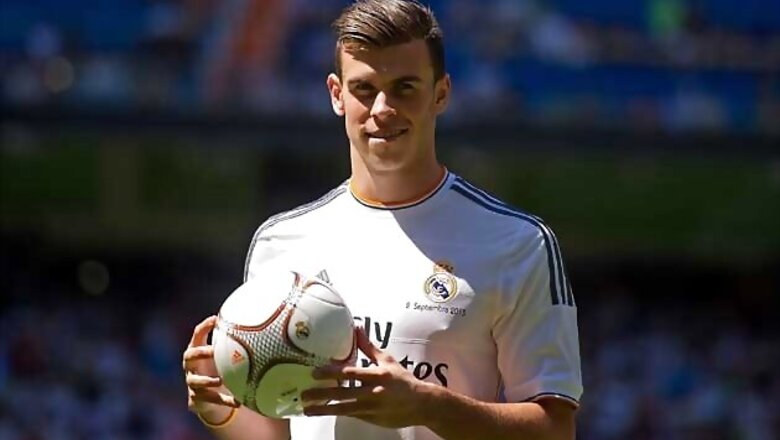
views
Barcelona: Gareth Bale's move to Real Madrid to join Cristiano Ronaldo will no doubt boost the star power of the Spanish league as the club challenges Lionel Messi and Neymar's Barcelona for the title.
But beneath the glamour that Bale's signing brings there festers an ongoing crisis in the Spanish game: the days of entertaining football beyond the Santiago Bernabeu and Camp Nou may be numbered.
Simply put, the Spanish league is financially rigged for two of its 20 topflight teams to triumph. And Madrid's ability to pay a world-record 100 million euros ($132 million) to Tottenham for Bale only underscores the tremendous, and growing, wealth gap.
Barcelona and Madrid pull in €140 million ($185 million) a year each from television revenues. The next-highest earner, Atletico Madrid, gets €47 million ($62 million). Minnow Rayo Vallecano receives €14 million ($18.5 million).
Madrid and Barcelona are the world's richest teams. But while they saw their income rise by 7% during the 2011-12 season with Madrid earning €512.6 million (then $683 million) and Barcelona €483 million (then $643 million), most of the rest of the clubs in recession-hit Spain had to sell their best players this offseason to pay down debt as several, like Rayo, try to emerge from bankruptcy protection.
Messi and Ronaldo finished one-two at the top of the league's top scorers list last campaign. The next best trio of goalscorers- Radamel Falcao, Alvaro Negredo, and Roberto Soldado- all left along with a slew of other players who have emigrated over the past few seasons.
That means fewer threats for Madrid and Barcelona defenses to worry about, and less competition for fans to enjoy. Negredo said the choice to leave Sevilla for Manchester City was easy: stay and lose again, or leave and have a shot at winning.
"I chose England because I thought it was best for me. And besides, only Madrid and Barcelona win the Spanish league now," said Negredo. "To win you have to be on one of those two teams. That's why players leave to come here. You just have to look at the great season Atletico had last year to only end up so many points behind."
Even Spanish media, which once insisted the Spanish league was the best, is now calling for action to reduce the gap between the two powerhouses and what is often referred to as "the other league" of the remaining teams.
All of Europe's football leagues favor the wealthiest clubs. But nine straight years of dominance by Barcelona and Madrid- only once since 2004 have the two not finished first and second- has dismantled the fiction of a wider field of contenders.
No other major European league except the Portuguese has been ruled by two teams for as long. In the same nine-year span, France has had six different champions, Germany four, England and Italy three.
Barcelona and Madrid, meanwhile, just keep getting better: they have each won the league with a record 100 points the past two seasons. Diego Simeone led Atletico to a third-place finish last season that it capped by beating Madrid in the final of the Copa del Rey. Even so, the Argentine manager insists that a league title run is out of the question as long as the TV money is not redistributed more equitably.
"Barcelona is superior, Madrid is superior. The league will continue to be theirs due to the economic power they have," Simeone said. "How long has it been? Nine years? This will be the 10th."
While that is likely, it doesn't mean that all the talented players in Spain come from its elite clubs.
International standouts such as David Silva, Fernando Torres, Michu, Javi Martinez, Santi Cazorla, Jesus Navas, and Fernando Llorente all came from other teams.
Atletico's win over Madrid in the cup final last May and its strong showing in the Spanish Super Cup that it lost to Barcelona last week mean that despite what Simeone said, it would not be a complete shock to see it stay in the hunt for a second-place finish.
Permanently in the shadows of the giants at home, Spanish teams should continue to perform well in Europe this season. Look for Atletico and Real Sociedad to do well in the Champions League, while Valencia, Sevilla, and Real Betis are candidates to win the Europa League.
Even mid-to-bottom table sides like Celta Vigo or promoted Villarreal and Almeria renounce defensive tactics and look to carry the initiative.
This makes for exciting weekends at grounds across the Iberian peninsula. But that is in danger with players leaving in droves and clubs struggling under the burdens of tax debt, back wages, and sinking real estate investments.
Several clubs have spent years campaigning in vain for a greater share of TV revenues. Miguel Cardenal, president of Spain's Sports Council, has said the government wants to propose a law before the end of 2013 that will empower the league to take control of the sale of TV rights, leading to a fairer division of the earnings.
If that proves to be nothing more than lip service, the Spanish league will remained locked in a downward spiral.
















Comments
0 comment